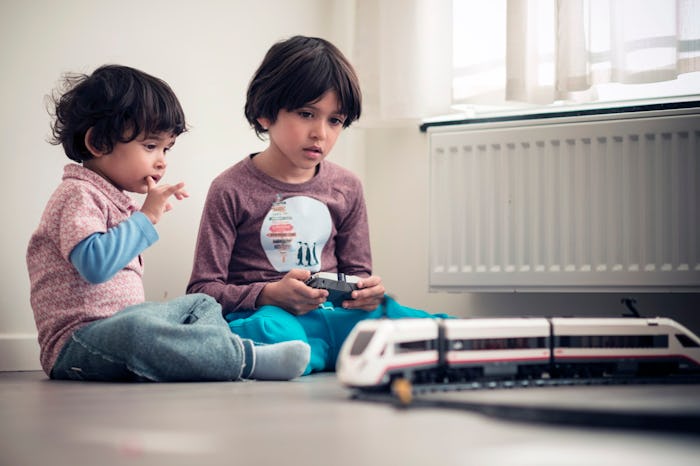Life

9 Ways To Help Your Toddler Socialize
Learning to communicate and interact with your toddler is a challenge. You’re trying to teach them words and norms, and they are trying to understand this confusing world, which usually results in tantrums, food on the floor, and the word “no” being yelled repeatedly. This becomes more difficult when you try to teach your child to interact with other kids. Put a group of small people with no social skills, emotional coping mechanisms, or grasp on appropriate behavior together, and chaos ensues. But since social interaction is such an important part of our world, how can you help your child navigate these rough waters?
If your toddler doesn’t have siblings to interact with and doesn’t attend daycare, it’s harder for them to learn to socialize. Therefore, it’s important to seek out other ways to help your child learn to interact with children their own age. When they spend their days only talking to adults (like my kid does), you may find that they’re more hesitant to play with other kids. That’s OK, but it’s also helpful to provide opportunities for them to learn to socialize with other children. These tips are helpful for neurotypical kids, but may not work as well for autistic children (I’m using identity-first language here) or otherwise neurodiverse children. You know your child best, so always trust your gut and find things that work for them.
1Have Realistic Expectations
Knowing what behaviors are appropriate for your child’s age group is important. BabyCenter notes that children younger than 3 years old may participate in “parallel play,” where they play alongside each other, as opposed to playing with each other. So if you see them spending time next to a child without talking (or, more realistically, speaking gibberish), don’t panic.
2Schedule Playdates With Other Kids
It’s hard for your child to socialize if they’re not encountering other kids. Playdates at your home, other homes, or the local park can be a great way to introduce your toddler to kids their age.
3Find A Group Or Class To Attend
Aside from one-on-one playdates, classes or groups are important, too. These structured get togethers help your child develop a routine, follow rules, and be in environments where there are many children and personalities to navigate and tolerate. It’s also important to find diverse groups of kids, so your child gets used to not always being around children that look or act like them.
4Let Them See You Socializing
Children mirror the adults in their life, and they will model behavior they see you engaging in, for better or for worse. If they see you socializing with others, they’re likely to follow suit.
5 Allow Them To Figure Things Out
In order to learn how to share and constructively interact with other kids, there will be some bumps in the road. There will be stealing of toys, crying, and maybe even hitting. If you step in every time one kid takes a toy from another, you’re hindering their ability to figure social situations out for themselves.
6Utilize Sportscasting
Coined by the founder of Resources for Infant Educarers, Magda Gerber, sportscasting is the technique of narrating events to toddlers and young children, where you stick to the facts of the situation and make neutral observations. (For example, “Johnny has the doll. Susie took the doll from Johnny. Now Johnny is crying.”) It’s a great way to give children the space they need to learn to think critically about their environment and help them learn emotional intelligence and empathy.
7Be The Mediator
There are times, however, when a parent needs to step in. If a disagreement has escalated to the point when someone could get hurt, it’s important for parents to make sure that everyone stays safe.
8Give Them Breaks
Alone time can be just as valuable to your child as play dates. This is how they discover their own interests and personalities.
9Trust Your Kid
Ultimately, you know your child. Every kid will be different in social situations — some will be assertive, some will be aggressive, some will be shy, others will cling to you. Don’t push your child to do things so far out of their comfort zone that you risk them never wanting to try again, and let your child guide you on your journey.
Images: Courtes of Philippe Put/Flickr; Giphy (9)